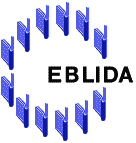
|
|
|
EBLIDA StatementTowards an effective scientific publishing system for European research, April 2005 |
EBLIDA welcomes the timely initiative of the Commission to conduct a study[1] on the economic and technical evolution of the scientific publications market in Europe.
EBLIDA, the European Bureau of Library, Information and Documentation Associations, is an independent, non-profit umbrella organisation of national library, archive and information sector associations and institutions in Europe. EBLIDA represents the interests of its members to the European Institutions with a focus on intellectual property rights, DRMS, information society, educational and cultural matters.
EBLIDA promotes access to information and culture in the digital environment for the purposes of education, research and private study.
EBLIDA supports the vision of open access to research material, which has been defined as ‘free availability on the public Internet, permitting users to read, download, copy, distribute, print, search, or link to the full texts of these articles, crawl them for indexing, pass them as data to software, or use them for any other lawful purpose, without financial legal or technical barriers other than those inseparable from gaining access to the Internet itself.’
There are two main routes to achieving open access, and we wish to register our support for both. The first one is open access journals. The number of open access journals has been growing in recent years, with some publishers offering their entire journals on an open access basis, and others offering it only for selected items.
The second route is self-archiving, where authors deposit the final, post peer reviewed, electronic version of their articles in their private archive, an institutional, or subject-based, repository. A growing number of publishers expressly permit self-archiving of the final version of the research output. This is encouraging; however the majority of those publishers do only allow limited use of such self-archived copy. Usually use is allowed within the institution that owns the repository and for private study purposes only, not for educational or teaching purposes.
EBLIDA believes that open access to European research is a win-win strategy that has tremendous potential reconciling the ownership of intellectual property rights in research findings and the economic interests of the publishers of such findings.
Open Access would be easier to achieve if commercial publishers do not require the assignment of intellectual property rights by the owner of such rights as a condition of publishing the research outputs in a commercial publication. This has been the standard model used by a majority of commercial publishers and, because of the monopoly they thereby achieve, it has allowed them to increase annual subscription charges of research publications by 10% or more. Some commercial publishers are changing their policy and are asking owners of intellectual property rights for a licence to publish the research findings, thus freeing the author, as mentioned above, to deposit the peer reviewed research findings in their own or in an institutional repository.
We believe that raising the awareness amongst owners of intellectual property rights of the consequences of the assignment of intellectual property rights and the non-exclusive licensing of such rights to commercial publisher would benefit the access of information, the use of such information and open access initiatives enormously.
We would recommend that the Commission set up a working group with representatives of the European higher education community, other research institutions and publishers with the aim to agree on model licensing terms for the publishing of research outputs in commercial publications. In a fair and balanced environment such terms should allow for the depositing of a copy of the peer reviewed article in an open access local repository or a subject repository and which can be used for private study, research, education and teaching purposes.
This would contribute to create a more effective and efficient system for scholarly communication inside and outside the European Union.
The current system where outputs of research funded from the public purse have to be bought at a high price from external commercial bodies in order to gain restricted access to the same research outputs needs to be brought to an end as soon as possible.
The Hague,
April 2005